Now Playing
Current DJ: The Audible Snail
Ramones Pet Sematary from Brain Drain (Sire) Add to Collection
Requests? 773-DJ-SONGS or .(JavaScript must be enabled to view this email address)
Welcome to The Fourth Wall, CHIRP's e-conversation on cinema. This week's subject is the the state of the horrror film genre.
This edition is written by CHIRP Radio volunteers Kevin Fullam and Clarence Ewing.
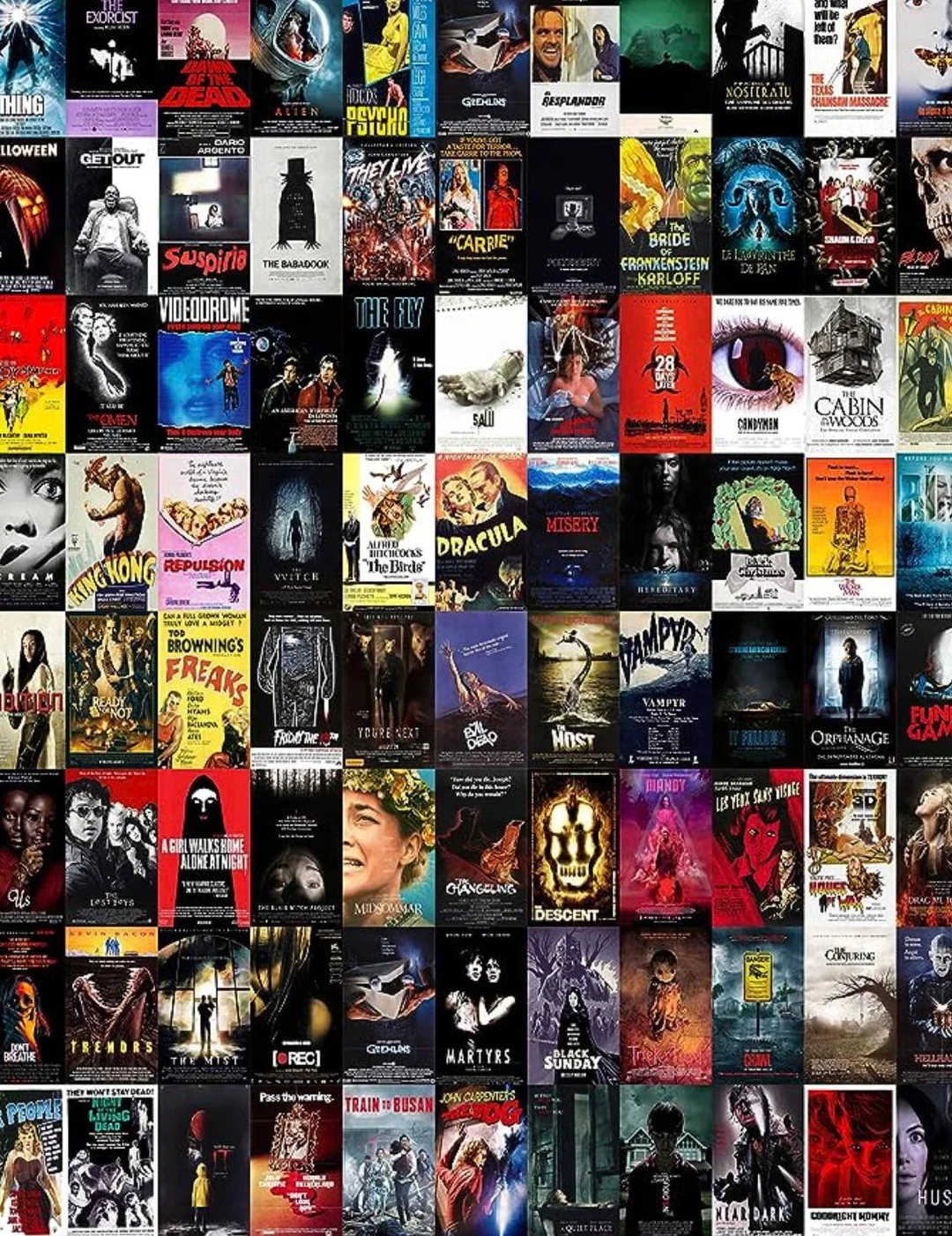
Clarence:
It’s Halloween season once again! And of course, a perfect time to fire up the horror movies old and new.
I’m not what you would call a hardcore fan of the genre, but I do respect it when it’s done well. I also appreciate the detailed history of scary movies, from the classic monster flicks of the ‘30s to the atomic scares of the ‘50s to the the psychedelic arthouse cinema of the ‘60s to the Golden Era of the ‘70s and ‘80s (which gave us classics ranging from mainstream blockbusters to grindhouse B-movies) to the self-aware Scream / I Know What You Did Last Summer kicks of the ‘90s to the Saw franchise (and its imitators) of new millennium.
Welcome to The Fourth Wall, CHIRP's e-conversation on cinema. This week's subject is the 2023 Romanic Drama Past Lives.
This edition is written by CHIRP Radio volunteers Kevin Fullam and Clarence Ewing.
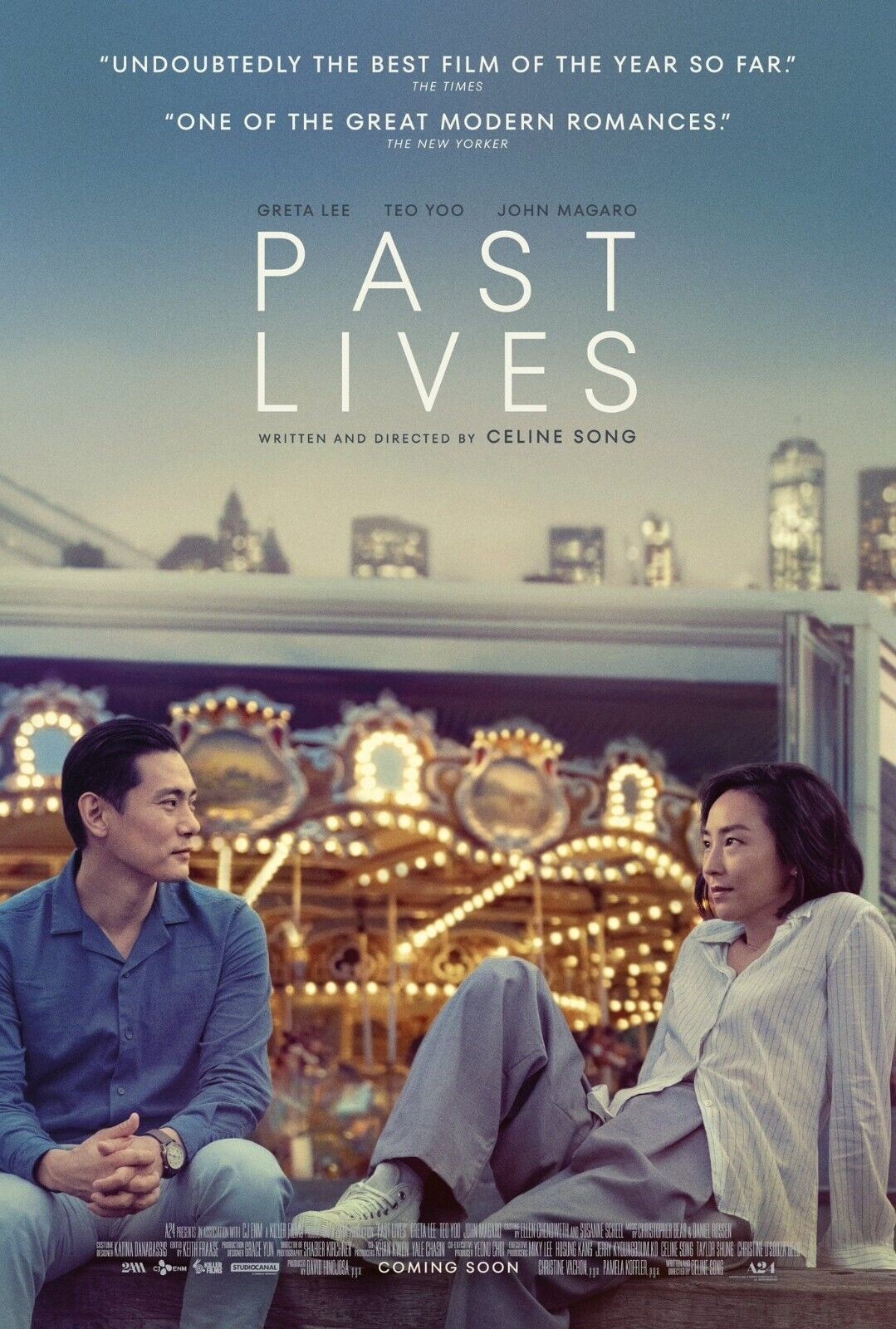 Kevin:
Kevin:
"Is he attractive?"
-- "I think so. He's really masculine, in this way I think is so Korean."
"Are you attracted to him?"
-- [PAUSE] "I don't know... I don't think so..."
That's not quite the exchange that any husband wants to have when his wife is reconnecting with an old flame, is it? Except that the third party isn't really an old flame. Or is he? It's... complicated.
Let's back up a minute. Past Lives is a story primarily told in three chapters. Na Young (Greta Lee) and Hae Sung (Teo Yoo) are 12-year-old classmates in South Korea who go on one playground "date" before Na's family immigrates to Canada.
A dozen years later, Na (now having changed her name to Nora) reconnects with Hae via Facebook while studying playwriting in New York City. They have a certain chemistry, but nothing comes of their video calls. With their lives headed in different directions, they're unable to coordinate a get-together, and so any spark that was there fizzles out.
Twelve more years pass, and Nora is now married to an American, Arthur (John Magaro), whom she met at a writer's retreat, and they're living together in NYC. Hae contacts Nora out of the blue -- he's headed to America for an impromptu vacation, and wants to know if she'd like to meet. She does.
Their rendezvous, along with the following evening when the three of them meet for dinner, comprise the heart of the story. Does Nora still have feelings for Hae? How much has Nora's time in the West exacerbated the cultural divide between them? And where does Arthur now see himself vis-à-vis Nora?
Welcome to The Fourth Wall, CHIRP's e-conversation on cinema. This week's subject is the 2023 film The Killer.
This edition is written by CHIRP Radio volunteers Kevin Fullam and Clarence Ewing.
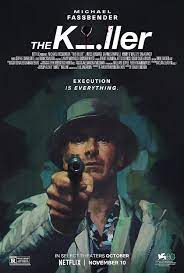
Kevin:
"Stick to your plan. Anticipate, don't improvise." -- the titular protagonist of The Killer
Are we sure that The Killer doesn't moonlight as a day trader? As someone who watches the markets, I find myself repeating similar mantras each morning. But never fear, Ye Reader -- the soul-crushing monotony that describes the life of an assassin here is pretty much a non-starter for yours truly. Waiting. Waiting. Always waiting.
David Fincher's new film, The Killer, seems like a bit of a stylistic salute to his 1999 magnum opus Fight Club. Both are adaptations of novels and feature plenty of internal monologues. And both feature leads who possess a certain implacability born of shattered psyches. In the latter, The Narrator (Edward Norton) develops his Thousand-Yard Stare along his descent, whereas the eponymous "hero" (Michael Fassbender) of The Killer displays a stony demeanor from the opening bell.
If The Killer is on your trail, somebody very, very rich has decided that you should no longer be breathing. As Jaqen H'ghar from Game of Thrones once put it: "A minute, an hour, a month. Death is certain. The time is not." Until the day comes when death isn't certain -- a bystander gets in the way of a bullet meant for a target. The Killer's mission is aborted. And his employers, per standard operating procedure, immediately decide to cover their tracks by eliminating all loose ends.
Thus kicks off the heart of the tale, as The Killer realizes that he'll never be safe until his tracks are indeed covered... but in the opposite direction. Predator vs. prey? No. Predator vs. other predators. It's his employers and their hired guns who have to disappear.
Welcome to The Fourth Wall, CHIRP's e-conversation on cinema. This week's subject is the 2006 film Casino Royale.
This edition is written by CHIRP Radio volunteers Kevin Fullam and Clarence Ewing.
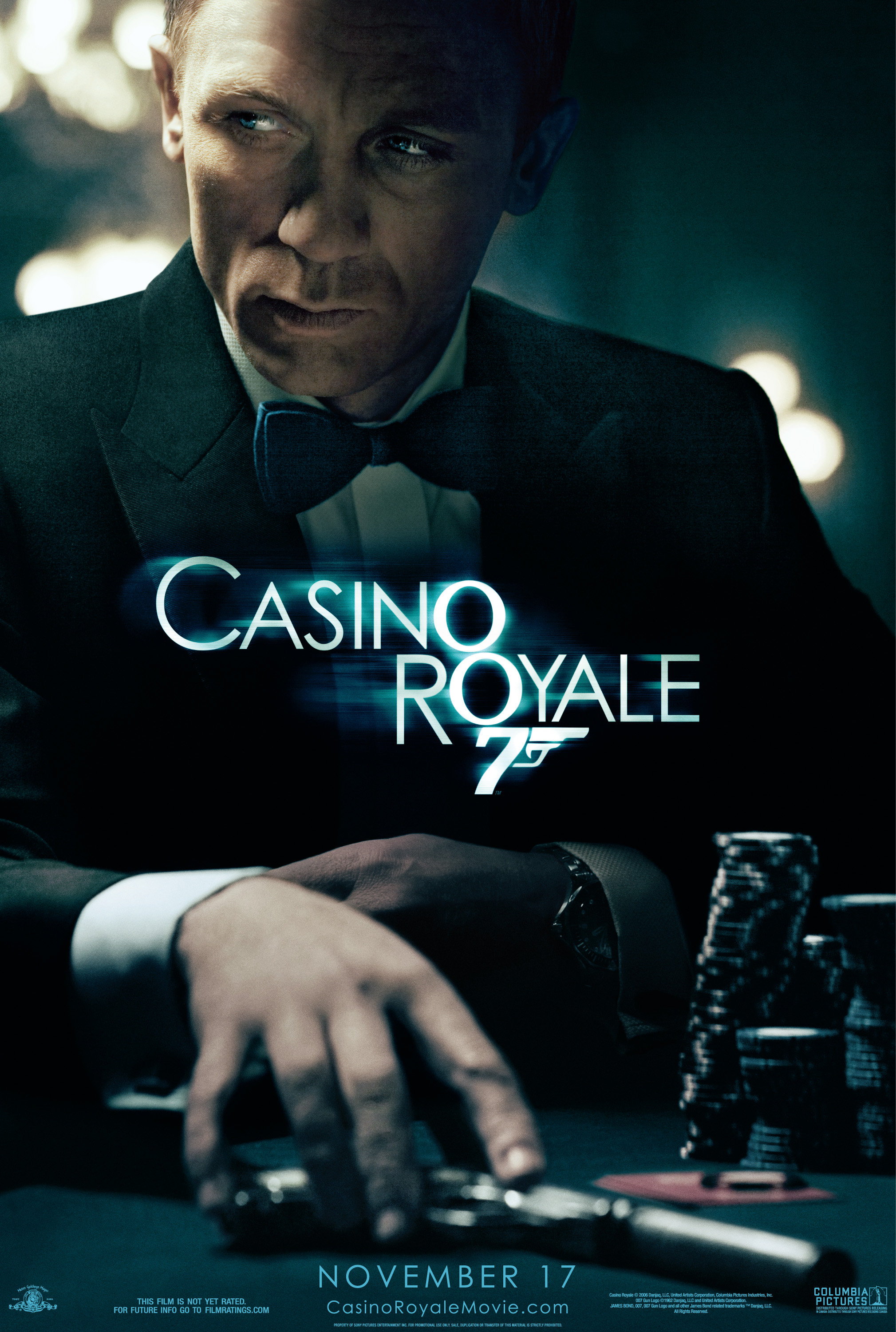
Clarence:
“Bond. James Bond.”
Anyone who knows anything about film history will recognize that famous introduction. Even those who have never seen a frame of the 25 feature films on which this character is based.
I was one of them. Until a few months ago, I had never seen an entire James Bond movie in one sitting. I was familiar with many of the scenes, the one-liners, the cultural discussion of the character and the actors who played him. But not the movies themselves..
Recently, though, I’ve binge-watched all five of the Bond films featuring its most recent lead actor, Daniel Craig. I remember when he made his first Bond appearance in Casino Royale in 2006 there was controversy around how a blond-haired, blue-eyed actor, even a talented one, could pull off such an iconic role. Skeptics needn't have worried; He did, and continued to for another 15 years.
Casino Royale is a bit of a strange entry in the Bond series. The first movie to carry that title (released in 1967) isn’t considered official canon for several reasons and was panned by critics when it first released, but it was based on the Ian Flemming novel of the same name, in which the character James Bond first appears.
Welcome to The Fourth Wall, CHIRP's e-conversation on cinema. This week's subject is the 2022 film Barbarian.
This edition is written by CHIRP Radio volunteers Kevin Fullam and Cassondra Branderhorst.
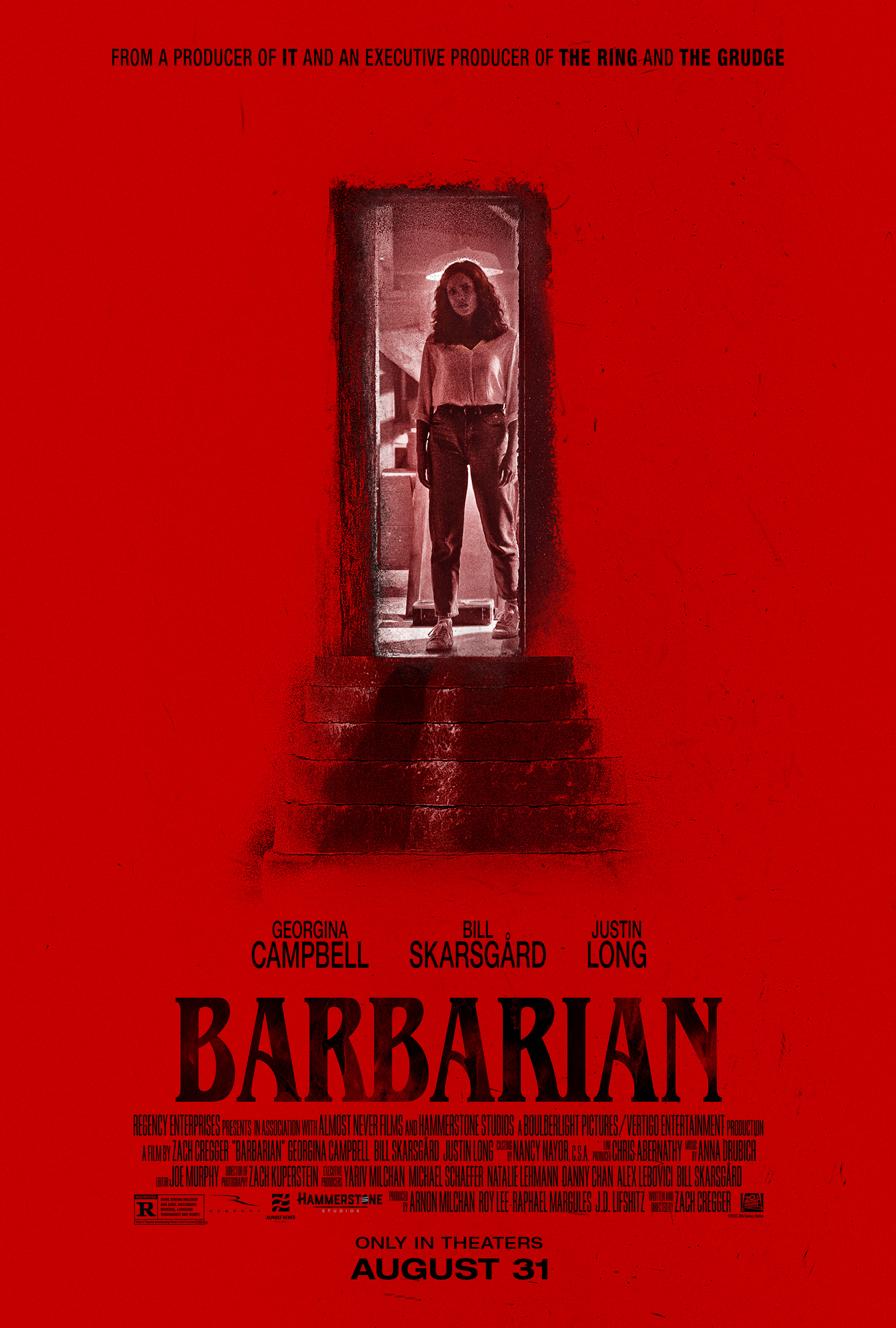
Kevin:
Too Dumb To Live: "There's simple ignorance, when you just didn't know something. There's catching the Idiot Ball, which is a momentary lapse. There's fear and panic in a chaotic situation. All those situations are understandable reasons for making poor decisions... Then there's these guys. People who are so stupid that they simply do not deserve to survive." -- The bible of storytelling devices, TV Tropes.
When we invest our time in a horror film, we implicitly enter an unspoken agreement to cut the screenwriters some slack. Situations which would send any sane human heading for the hills have to be massaged in such a manner that keeps the narrative rolling. If Poltergeist played out the way Eddie Murphy describes here, it would have been a very short movie indeed.
The question is... how much suspension of disbelief should we allow? Even within a genre where we need to willingly go along with all sorts of supernatural plot twists, doesn't there come a point where enough is enough? This brings me to one of the biggest indie horror hits of the past year, Barbarian.
Twentysomething Tess (Georgina Campbell) arrives late at night at an Airbnb in a terrible Detroit neighborhood; she has a job interview the next day. We've all read the stories about Detroit, yes? This ain't just a rundown section of the city -- the house is the only intact building on the block. She can't access the key to the house because, surprise, it's been already rented out to another guest, Keith, via a different lodging service.
Tess manages to rouse Keith (played in amicable yet creepy fashion by Bill Skarsgård) and reluctantly accepts his invitation to enter the house. And so begins a long stream of character decisions which run the gamut from "questionable" to "batshit crazy."
1) Tess would wisely rather get a hotel room than share a house with a strange man. She contacts one hotel, finds out it's booked (due to a big conference, Keith explains), and promptly gives up. Er... what? She wouldn't go down the list of hotels? Fire up Expedia? Look for suburban options? Anything? But OK, as I said, we've gotta just roll with it.
2) Keith wins her over and Tess stays -- despite the fact that her bedroom door mysteriously opens during the night. Seeing as how Tess can clearly see the next morning that her home resides in something resembling a bombed-out war zone, you would think she'd pack all her stuff so that she could leave town straight after her interview, right? Nope. Again, questionable, but whatever.
3) Tess is back at the house and on edge, barely making it inside after getting chased by a homeless denizen. Keith is gone, and after Tess gets locked in the basement (via another mysterious door), she discovers a hidden passage that culminates in a dingy room with a bed, a camera tripod... and a bloody handprint on the wall. Now that triggers some serious internal alarms, and when Tess is rescued from the basement by a returning Keith, she's ready to bolt.
4) But now it's Keith who refuses to listen. Cassie, if I came to you and said, "The building we're in has a dungeon of horrors down below and we've gotta get outta here, pronto!," would you still need to investigate for yourself? And if you did venture down there and didn't return, would I come after you? (Sorry, ladies, you can lament all you want about chivalry being dead, but sayonara.)
It makes even less sense that Tess would go in after Keith. She has no weapons. It's a reasonable assumption that whatever swallowed up Keith (and we do discover what that is) would do the same to her. Even if you wanted to help Keith, wouldn't you lock yourself in your car, call the cops, and wait for them to arrive?
Despite these critiques, Barbarian does deliver an uber-creepy first act -- leading to a bit of a hilarious mood jolt when the focus abruptly shifts to up-and-coming (or so it seems) actor AJ (Justin Long), cruising along the California coast in a convertible. Due to a combo of circumstances and unseemly behavior, he'll soon find his way to Detroit as well. As it turns out, AJ owns the mysterious house in question, and his return will not bode well for him.
One can't really deliver more plot details without venturing into serious Spoiler Territory. Just know that AJ does cross paths with Tess, and the forces that lurk in the labyrinthine basement corridors are quite sinister indeed.
-- The film could definitely be Exhibit A as far as gender/power imbalance. Tess flat-out admits that she'd never allow Keith to stay with her if the roles were flipped and he had showed up on her doorstep at night. Keith is calm and collected (if a tad offputting) while trying to convince her to stay, perhaps with amorous intentions lurking? And then there's AJ, who not only might've date-raped a co-star, but also exhibits a foolhardy level of bravado that I doubt you'd see in the most drunken of Vikings. At one point, he explicitly threatens any unseen evildoers by saying, "I'm a man!" If AJ was secretly pining for Valhalla, he was not disappointed. What did you make of this? On point, or perhaps over the top?
-- Let's return to the topic of suspension of disbelief. Maybe Barbarian didn't cross your particular threshold? And if not, have there been other horror films in the past which have? Beyond what I've already described, there's a Final Act moment where a character gets thrown off a water tower that must've been... what, 50 or 60 feet high? More? And lands on asphalt. And survives. ?!?!?!? Words fail me here.
Cassie:
Horror movie legend (and one of my own personal heroes) Sam Raimi asserted that horror movies must abide by three major rules: the innocent must suffer, the guilty must be punished, and the hero must taste blood to be a (wo)man. All of this is done in Barbarian, and while a HUGE amount of suspension of belief is required to get through the film, at the heart of this story is the question: "who are the real monsters?"
Had any of the characters made better decisions, this would have been a short movie. But disaster could've also been averted had any of the characters actually listened to our female protagonist, Tess. Keith doesn't listen when she begs him to stay out of the basement, the police very obviously do not listen to her when she begs them to investigate, and AJ definitely doesn't listen to her pleas (and reaps his chilling reward in the basement). All the while, Tess continues to sacrifice herself in order to serve... men. Is it a coincidence that the protagonist and the major antagonist are both female? No. Also, another marginalized character's warnings are not heeded: the unhoused man Andre (Jaymes Butler). Which brings up the next point...
The setting for this film adds a symbolic twist. Detroit, the poster child for disadvantage and disrepair, takes center stage as does the subject of gentrification. Full disclosure, I was in Detroit this last weekend and it continues to be one of my favorite cities (besides Chicago, of course). While it retains a negative stigma, it is on the rise and, much like our beautiful city of Chicago, its bad reputation is mostly unfounded. However, this affords the perfect opportunity to also consider the horrors of poverty, deindustrialization, and the disintegration of once great metro-areas.
A couple more things to address before getting to your questions without too much spoilery: I loved the casting of AJ and Keith. Also, AJ definitely sexually assaulted that woman. We don't see it in the movie, but the implications were not subtle. In the age of "Me Too," we trust women, and he admits to it (while creepily and uncomfortably self-justifying it to his dude-bro friend in the bar), and then calls her to apologize against the advice of his attorneys. YIKES. On to the questions!
-- AJ was made out to be the quintessential, Hollywood a$$hole. He serves as a comedic foil, but he's also someone whom you want to see get his comeuppance. And boy does his uppance come! He was over the top, but this makes his demise much more satisfying.
-- All of the great horror movie baddies are virtually indestructible: Jason, Michael Myers, Freddie Krueger. They just won't die or, at the very least, won't stay dead. This is what makes them so iconic! And who doesn't love to see the once-thought-to-be-dead killer pop up in the background promising a sequel?
-- As mentioned above, there is some really interesting subtext in this film. While screaming at the TV is a very reasonable reaction (guilty!), the battle between our humanity and more depraved instincts lies just below the surface. Barbarian is an allegory for women and self-immolation in the interest of the preservation of men. It casts a light on our nasty human habit of not believing or listening to people because of their station in life. And, it forces us to see the evil in ourselves.
Despite all of the heavy subject matter, this movie also passes a personal bar for horror films: it was FUN! The dichotomy of comedy and horror keeps you on your toes. Not an easy balance to strike.
Kevin:
Well, I have to push back a little bit here. Remember that Tess also ignored the advice given to her (by another woman, no less) at the conclusion of her interview, when her prospective employer learned where Tess was staying. And I'm pretty sure that if any of us were accosted by ranting & raving homeless individuals, we would beat hasty retreats. It's not a case of ignoring a marginalized character -- it's simply good sense.
[On that note, the wisdom offered by said gentleman (Andre) turned out to be not so prudent after all! They were all "safe in the water tower," eh...?]
Cassie:
Appreciate the pushback-isn't it more fun if we disagree a bit? Tess did ignore the advice of her would-be employer, but we cannot be sure that she wasn't planning to leave. It appeared to me that she went back to meet back up with Keith? And also, weren't her things still there? Most people would be startled by someone running at them and yelling, but would it have been different if it was someone else better dressed, a woman, in a "better" neighborhood, etc.? The fear was likely a result of stereotypes that persist for people who are experiencing homelessness as a group (that they are all dangerous, mentally ill, have substance use disorder, etc.). The point is, sometimes women don't listen to women. But, men don't listen to women (or have the same radar for potential danger as women) far more often.
As far as Andre, that part was a head scratcher. Why did the mother leave him alone all that time and only decide to hurt him when he was with her "baby"? Did she believe that she was protecting Tess from the men (like she wished someone had done for her)?
Kevin:
The perception of Detroit for the past few decades is that the city is basically a giant DMZ: Enter At Your Own Risk. Crime data can certainly be misleading; Chicago is tagged as a high-crime metro, but all the city's most dangerous neighborhoods are concentrated on the South/West Sides. That being said, this report has Detroit as the second-most violent city in America, with a per-capita violence rate double that of Chicago. (And to be honest, given the lack of law enforcement and by extension police reports, that figure could be even higher.) However, you've been there recently -- how do you feel that Barbarian is painting an unfair picture of the town?
Cassie:
I spoke to a friend who is a long-time Detroit resident and pretty knowledgeable on the subject. He reported that though Broadmoor isn't super safe (he would advise against renting an AirBnB there), he used to play softball in a park there and has other friends that are there trying to turn the neighborhood around. Downtown Detroit is a very sleek metropolitan area; there are Gucci and Shinola stores, pop-ups in previously unused alleys, and many expensive pieces of real estate. It's cool. Are some areas more dangerous than others in the city as a whole? Sure. But, gentrification (which can be a double-edged sword) continues and the new development has been thoughtfully planned (thanks largely to Dan Gilbert). As NPR put it in a recent article, 10 years post-bankruptcy, the city is getting there. Of course, there are still some challenges it will need to overcome. When will the stigma abate? Time will tell.
Kevin:
Since we're talking about Detroit and film... any thoughts about the RoboCop statue? The original movie is a landmark work full of brilliant satire, but why would the city want to celebrate this? A saga about a lawless Future Detroit that's been beaten into submission by corporate overlords? It's a bit puzzling.
Cassie:
Oh, the RoboCop statue. It was a crowdfunded venture. Much like one of the funniest stories about what can happen during crowdsourcing, it does seem silly. But, let's just let Detroit have this one, okay? Okay! 😊
Kevin:
Completely agreed that Jason, Michael Myers and the like are written as nigh-invulnerable antagonists. (The level of firepower arrayed against a single guy with a rusty machete here is almost comical.) But Tess ain't Rasputin, and she was the one I was referring to, regarding the fall from the very, very tall water tower. Are we supposed to believe that the creature somehow beat Tess to the ground despite diving a second after her? Even if this was the case, which seems impossible, it shouldn't make much difference. There's suspension of disbelief, horror yarn suspension of disbelief, and "come on!"
Cassie:
In short, yes. We are supposed to assume that the mother broke Tess' fall. But, what a great way for it all to end! The mother saves Tess only for Tess to be ultimately responsible for the former's demise (especially if what I pointed out above is true and the mother was only trying to protect Tess). Sometimes, women are the largest supporters and defenders of a patriarchal society that will ultimately harm them.
Kevin:
You mentioned that you saw the film as an "allegory for women and self-immolation in the interest of the preservation of men." Is this a bad thing, given the countless number of tales since time immemorial where men have risked life and limb to rescue women? It's actually pretty refreshing to see ladies return the favor in recent generations! Tess isn't quite Ripley from Aliens (a landmark action heroine) -- for one thing, Ripley would've never entered that tunnel unarmed.
Cassie:
Tess is a survivor; that much is clear. And yes, previously, movies made by mostly male filmmakers have featured the trope of the heroic male figure saving the damsel in distress. It was good to see Barbarian's damsel doing for herself, agreed. But the allegory I was pointing out is not literal. It's meant to make us examine the societal mirror it holds up.
Kevin:
Though if we're staying with that Aliens analogy, then AJ is definitely Carter Burke, a seemingly-affable fellow who quickly sells out any and all around him to save his own hide when the chips are down.
Cassie
This brings me back to the title of the film, Barbarian. The definition of barbarian according to Dictionary.com is: (n) a person in a savage, primitive state; uncivilized person OR a person without culture, refinement, or education; philistine. Who was the barbarian? The mother? By all accounts, she fits the definition. But what made her that way? A good argument could be made for the father or AJ being the real barbarians. Possibly both. Or maybe even the unhoused man in the film. Perhaps I'm reaching and it is meant to be taken at face value? (The street the house is on is called "Barbary," after all.) But I think we can safely expect social commentary from a director who was advised by The Jordan Peele on his film.